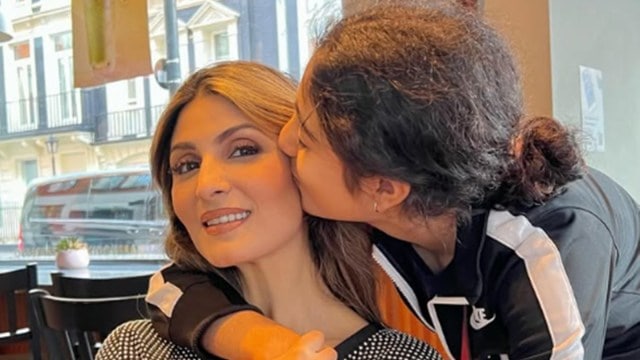📣 For more lifestyle news, click here to join our WhatsApp Channel and also follow us on Instagram
‘That was the first time I left Samara’: Riddhima Kapoor Sahni on when she was forced to leave daughter alone following Rishi Kapoor’s leukemia diagnosis
"It was before Covid-19 when he was diagnosed," recalled Riddhima Kapoor
 Riddhima Kapoor Sahni shares she has always been there with Samara (Photo: Riddhima Kapoor Sahni/Instagram)
Riddhima Kapoor Sahni shares she has always been there with Samara (Photo: Riddhima Kapoor Sahni/Instagram)For many Indian parents, the thought of leaving their child alone feels almost unthinkable. That is something even Riddhima Kapoor Sahni resonates with, as she recently admitted that she had never left daughter Samara alone before 2019, when her father, late actor Rishi Kapoor, was diagnosed with leukemia.
“I left Samara for 45 days for the shoot of a film recently. Before that, I had never left Samara for these years. The first time I ever left Sam was when dad fell sick. It was before Covid-19 when he was diagnosed. That was the first time in 2019. That was the first time I left Samara. I used to travel back and forth, and of course, New York,” she told Farah Khan on her cooking channel.
Taking a cue from her admission, let’s explore what it means to have a constant presence as a parent.
Delnna Rrajesh, psychotherapist, energy healer, and life coach, said Riddhima’s words may seem like a simple anecdote, but they pull back the curtain on a much larger truth: in countless Indian households, parenting is defined by constant presence; a style born of deep love, but shadowed by hidden fears. “This style often begins as attachment parenting, but in its extreme, it mutates into enmeshed parenting, where a parent’s identity is so fused with the child that even a short absence feels like abandonment. What looks like devotion is often fear wearing love’s clothing,” said Delnna.
The answer is not to stop being present. “But to be present with freedom. To raise children who feel secure enough to thrive even when you’re not in the room. To reclaim your own self without losing your bond,” shared Delnna.
 Rishi Kapoor passed away in 2020 (Varinder Chawla)
Rishi Kapoor passed away in 2020 (Varinder Chawla)
Imagine trying these shifts:
Five minutes of connection, five minutes of disconnection: Give your child five minutes of undivided attention. “No phone, no distractions. Then step back for five minutes, letting them play, explore, or make a decision on their own. This balance teaches: I’m here for you, but you are strong on your own too,” said Delnna.
Protect “me-time” and “we-time”: Pursue your passions, friendships, and career. This model is self-care, not selfishness. “And nurture your marriage: a walk, a conversation, a date. Children grow stronger watching parents love each other, not just parent them,” expressed Delnna.
Practice small let-gos: Let your child pick mismatched clothes. Let them choose their snack. Leave them with a trusted relative for a short while. “These tiny steps build independence — for the child and for you,” said Delnna.
Write your guilt before acting on it: When guilt screams, “don’t leave,” pause. Journal it. Is this fear about your child’s safety, or your own fear of being dispensable? “Seeing it on paper turns emotional storms into manageable truths,” advised Delnna.
Heal your own inner child: Many parents who can’t let go are still carrying their own wounds of abandonment. “Heal those wounds — through therapy, reflection, or healing practices — so your child doesn’t inherit them as invisible chains,” said Delnna.
DISCLAIMER: This article is based on information from the public domain and/or the experts we spoke to. Always consult your health practitioner before starting any routine.
📣 For more lifestyle news, click here to join our WhatsApp Channel and also follow us on Instagram




- 01
- 02
- 03
- 04
- 05






















